
How Long Does Food Take to Digest?


How Long Does Food Take to Digest?
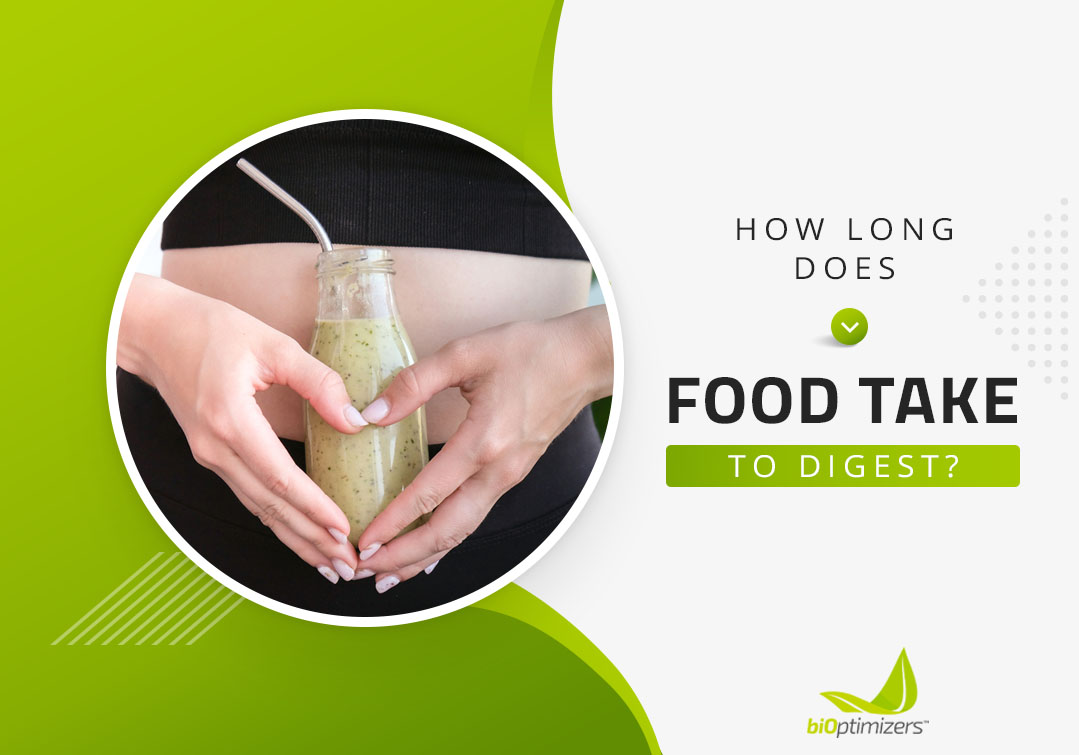
You take a bite of food and swallow it, but the journey doesn’t end there. The stomach does its work to break down the food and turn it into substances that can be absorbed by your body for energy. This process takes between three to six hours, depending on what you ate and how much you ate.
Once food and liquid pass from your stomach into the small intestine, enzymes break down proteins, carbohydrates, and fats into smaller molecules that can be absorbed through your intestinal wall. From here, these nutrients travel through your bloodstream until they reach their final destination: either stored as fuel or used immediately by various organs such as muscles or brain cells.
Finally, what you consume reaches the colon. It’s like an industrial complex where digestion continues by using bacteria to produce vitamins B12, K, and B vitamins. Eventually, what’s left gets discharged as waste material or stool.
It’s fascinating to think about the journey food takes from your plate to the toilet. And it’s moved through that system automatically because your body is incredible and does all this work for you when you keep it healthy. Imagine what would happen if you were in charge of this process. With your body in charge, it starts as just some tasty tidbit on one side. But then, it becomes a source of nutrients and energy before finally making its way through all parts of your body, resulting in leftovers ending up somewhere else!

In this article, we’ll get you better acquainted with your digestive system, discuss the different digestion times associated with various kinds of food, and finish with some practical ways to improve your digestion. By the end, you’ll not only know how long it will take to digest certain foods but also be familiar with the journey and why it’s important.
Understanding Your Digestive System
To better understand how long food takes to digest, it’s essential to realize your gut is more than just a long tube that carries food from your mouth to the toilet. It’s actually one of the body’s most important systems. In addition, it takes care of some pretty important jobs essential to your overall health and well-being.
The health of the ecosystem that is your gastrointestinal system – called the microbiome – has been linked to everything from high blood sugar and excess body fat to mental health challenges [R]. This means that what you eat affects your physical health, brain function, and mood. So a healthy digestive system will improve overall wellness for you and those around you!
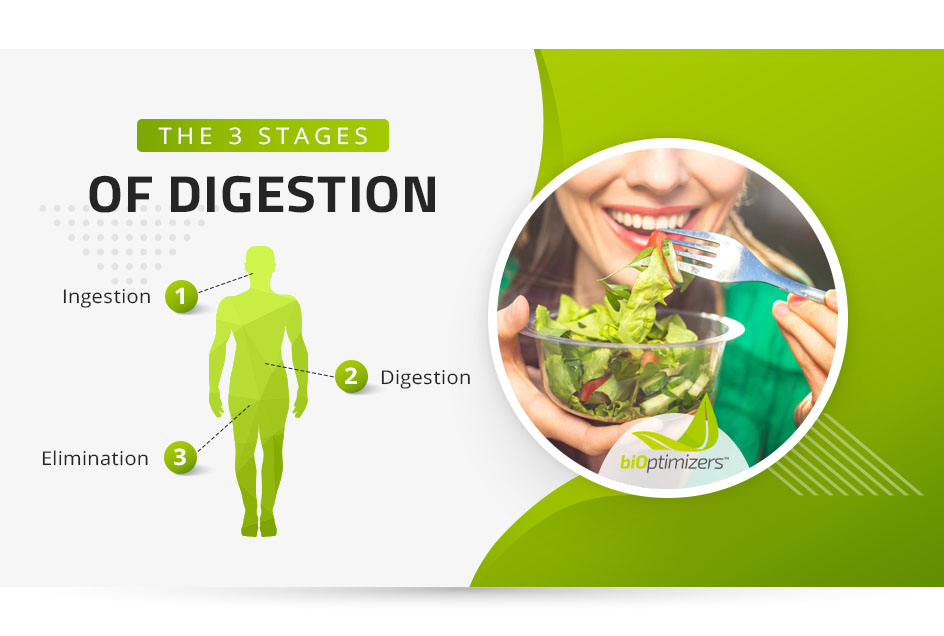
The journey of food through our bodies can be broken down into three stages:
- Ingestion
- Digestion
- Elimination
Each stage has unique characteristics that affect how long it takes for food to digest.
Stage 1: Ingestion
This process can start before food even hits your mouth. When you smell something, the molecules in the air will begin to travel through your nasal cavity down into your olfactory glands. These glands contain thousands of receptor neurons that are excited by the scent and send a signal to your brain, telling it what you’re smelling.
Aroma plays a crucial role in taste. That’s why food tastes bland when you have a cold and your sense of smell is blocked. The taste buds on your tongue can only identify salty, sweet, bitter, sour, and umami (savory) flavors – but they need help from your olfactory system to determine what it is you’re eating.
Once the food has made its way into your mouth and is within reach of your tongue, the second ingestion stage begins. This is where chewing and taste combine to help you identify what you’ve taken a bite out of. Your saliva aids in the breakdown of what you’re eating and transforms it, which helps your body absorb different nutrients down the line.
Stage 2: Digestion
Your digestive system can be divided into two parts: upper and lower. Food travels from one end to the other through a series of organs called the alimentary canal. This is what you call your gastrointestinal tract or GI tract for short, and it’s responsible for most of the digestion process.
As we mentioned, when food passes through the lips, tongue, and teeth to enter your digestive system, enzymes in saliva start breaking down carbohydrates. Other enzymes present in both saliva and stomach secretions continue this process of breaking down food.
The stomach takes care of most of this work, churning and mixing the contents inside further to break down food into a semi-liquid called chyme. The stomach walls contain cells that secrete hydrochloric acid – a solution of water, protein, and hydrogen ions that gives your stomach its acidic environment.
Once the mixture of food and stomach acids is ready, it’s released into the small intestine, where things really get going.
The small intestine has villi that act like shag carpeting on your GI system, providing a vast surface area for nutrient absorption to take place.
The villi are covered with microvilli, which both increase the surface area of the small intestine and act as their sort of digestive system within. In addition, they’re encased in a coating called the glycocalyx, which is composed of enzymes that break down sugars, fat, and proteins (remember you already activated some of these enzymes in the mouth and stomach).
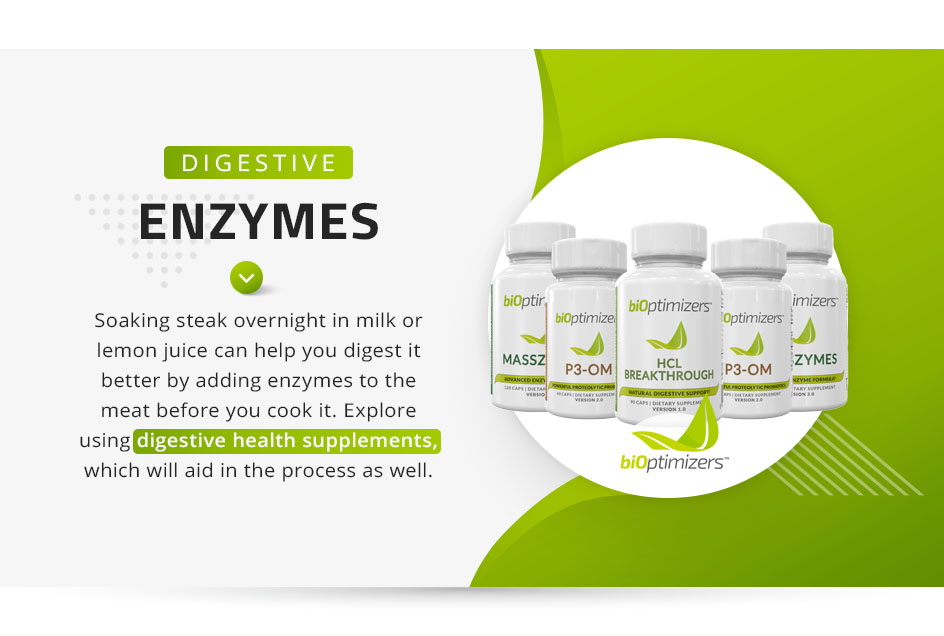
Other enzymes – peptidases – break down protein into amino acids and absorb it into your bloodstream. If you’ve ever had difficulty digesting red meat, it could be because your body needs some help creating these peptidase enzymes. Soaking steak overnight in milk or lemon juice can help you digest it better by adding enzymes to the meat before you cook it. You can also explore using digestive health supplements, which will aid in the process as well.
After all of this, what’s left are amino acids, sugars, and fatty acids that are absorbed into your bloodstream through the walls of intestine cells.
Stage 3: Elimination
What’s left behind? Not everything consumed during a meal will be broken down in your digestive tract. Instead, leftover food remnants enter the large intestine, also known as your colon. Water is removed from this mixture once again and what’s left becomes your stool or feces, which temporarily resides in the rectum until you have a bowel movement.
An average adult will have two to three bowel movements per day, but remember that this can vary depending on what you eat.
Different Food, Different Digestion Time
As we’ve already mentioned, not all food will take the same amount of time to digest. In addition, what combination you consume them in can also have an impact. So let’s take a closer look at a few categories.

Carbohydrates – Generally speaking, we can break carbs into two types: slow and fast. Slow carbs generally take longer to digest, so you’ll feel full for extended periods. Foods like oatmeal, whole wheat bread, and sweet potatoes are great examples of these sorts of carbohydrates.
Fast carbs digest faster and help boost energy when consumed alone or in a cereal bar after a workout. Examples of these include candy, soda, and white bread.
Most carbs will be digested within four to five hours max.
Fat – When you hear the term “slow digesting,” that probably brings higher fat content foods like eggs or bacon to mind. However, not all fats are created equal regarding digestion time, so don’t assume eating a high-fat meal will sit heavily in your stomach all day.
Fats that take a long time to digest include polyunsaturated and monounsaturated fats, such as those found in salmon and olive oil. Trans fats take the longest to digest of all. They’re used in processed foods like potato chips and fast food burgers and take a long time to break down. Sometimes as long as three days!
Protein – Like carbohydrates, we can divide proteins into two categories: fast- and slow-digesting. High-protein foods like fish and beans take longer to pass through your digestive system than sugar or fats. Fast-digesting proteins would include things like eggs and deli meats.
Protein usually digests within four to five hours but can take up to eight hours.
Fiber – Dietary fiber is found in plant-based foods, and soluble and insoluble forms exist. Soluble will slow things down, while insoluble will speed things up. For example, some types of cereal contain added fibers that can help regulate your bowels so you’ll feel fuller longer. Insoluble fibers like those found in wheat bran or nuts can also help clean your digestive system as they push food through.
Many people add soluble or insoluble fiber to their diet as a supplement because it helps them have more regular bowel movements and feel better.
Practical Ways to Improve Digestion
Unfortunately, not all of us are gifted with the best digestive systems. And some of us mistreat them a lot during our lives. Not to worry, though. There are ways to combat this! Here are 10 simple tips to help you maintain proper digestion:
- Chew slowly and thoroughly – When people think about the digestive process, the mind immediately turns to the stomach. However, as we’ve mentioned, digestion begins as soon as the first bite of food enters your mouth. Therefore, the longer and more thoroughly you chew, the easier it will be for enzymes to break down what you eat so that improved digestion will be carried out by your stomach and small intestine. Not to mention, when you take longer to chew, you can derive more pleasure from your food because saliva not only carries enzymes that aid in the digestive process but also helps you taste your food more.
- Eliminate foods that cause digestive discomfort – If certain foods give you cramps or nausea, cut them out of your diet to see if the symptoms disappear. For example, many people find that giving up dairy can provide substantial relief when dealing with irritable bowel syndrome or other gastrointestinal issues. There are also digestive enzymes that you can get to help you with situations where you end up eating a meal containing ingredients that you’d typically avoid.

- Eat foods with higher fiber content – This includes food choices such as whole grains, beans, oats, seeds, vegetables, nuts, and fruits. Fiber is essential to the digestive process in people because it cannot be broken down by digestive enzymes like other types of food. Instead, it stimulates the release of more enzymes and helps push food through the gastrointestinal tract. If you’re not sure if you’re getting enough fiber from your food, try a fiber supplement taken daily with water.
- Add spices to your meals – Think about options like ginger, peppermint, fennel, cinnamon, thyme, basil, garlic, or mint. Add them to dishes for their ability to stimulate digestion. However, it’s important to note that not every person tolerates each of these spices the same way, and some may find them irritating. For that reason, use them sparingly at first and keep track of how they make you feel.
- Exercise regularly – It’s important to keep the body moving to promote proper digestion and healthy bowel movements. It’s easy to let your fitness routine slide when dealing with a stressful or busy time in life. Still, regular exercise keeps the bowels working well and enhances insulin sensitivity, which helps maintain proper blood sugar levels for improved energy. That sounds like a lot of wins!
- Reduce your intake of processed foods – Processed foods often negatively affect digestion more than whole foods. Common ingredients in processed foods that negatively affect digestion include sugar, artificial sweeteners, hydrogenated oils, MSG, and food additives like BHA or BHT. When shopping, read those labels and, when possible, opt for whole foods like fruits, vegetables, beans, seeds, and whole grains. When confronted with processed foods at parties or functions, keep some digestive pills on hand to help manage the introduction of unwanted ingredients into your system and keep you from having setbacks.
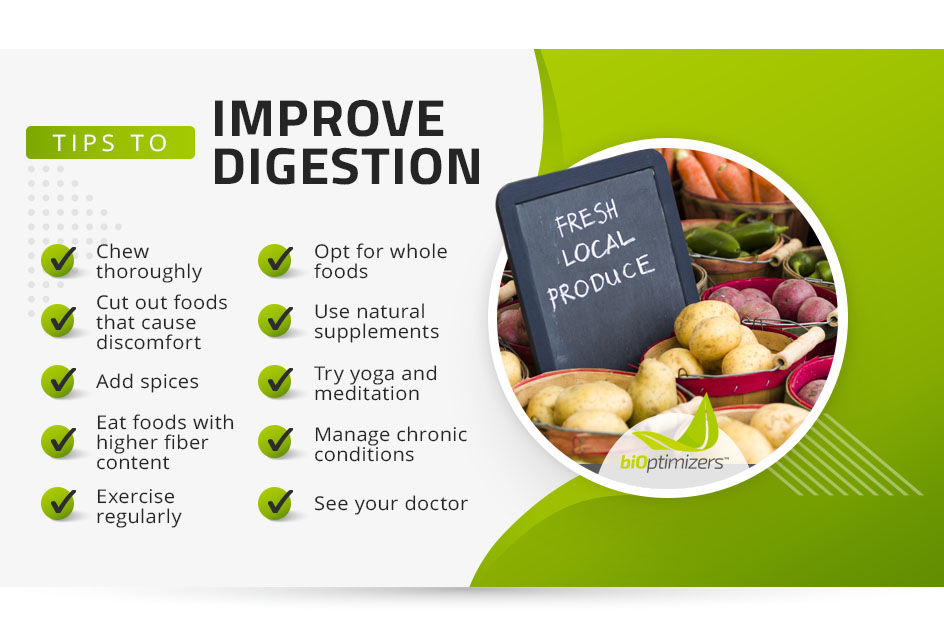
- Use natural supplements targeting issues – This can be tricky, but if you know you have specific problems like gluten intolerance, you can focus your efforts. Of course, when you can, avoid the trigger food in question. But this isn’t always possible. So in the case of gluten, it would help to use something like gluten digestive enzymes to help your gut.
- Try yoga and meditation – Why are these on nearly every list for anything about bettering your health? Because they work! Even when you’re having difficulty with digestion. Yoga and meditation work wonders as forms of stress reduction that can help slow down the body and bring it into a more relaxed state. Relaxation is essential for proper and timely digestion because too much stress will make you worried, triggering the release of stress hormones like cortisol. Cortisol causes the blood vessels to constrict and slows down your digestive processes by inhibiting stomach acid secretion and enzyme production.
- Manage chronic conditions – These often impact the transit time of food and nutrients. Examples include abdominal discomfort and high blood sugar. These can be incredibly hard to handle, so working closely with a trusted and compassionate healthcare professional and qualified dietitian will often be necessary.
- See your doctor – If you have trouble digesting food and don’t experience relief with the above measures, it may be time to talk to your doctor. It’s vital to identify temporary digestive issues versus chronic ones. When ignored for too long, digestive problems can worsen and lead to more severe health issues like colon cancer.
Digestion Is Important
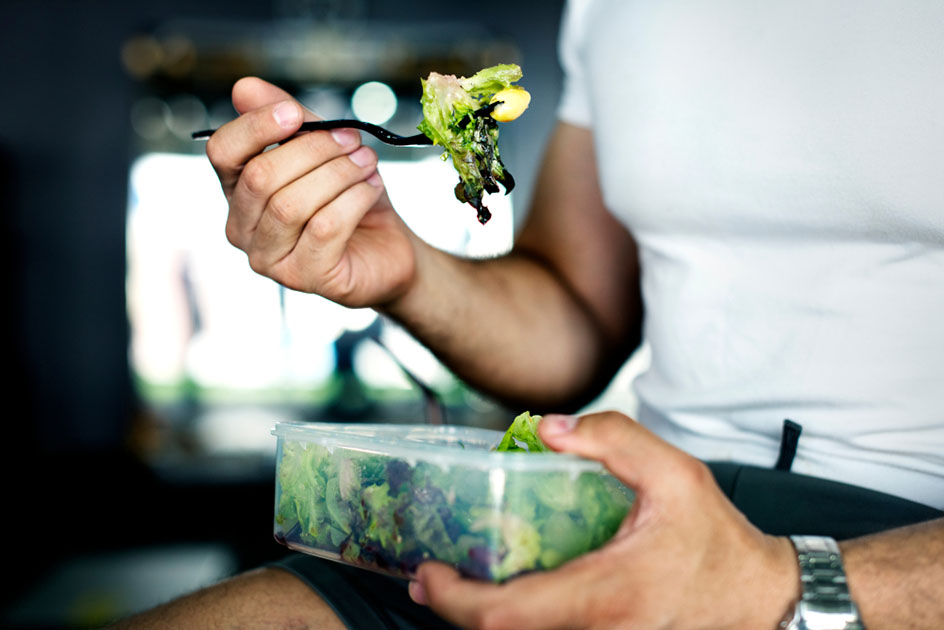
Ultimately, it’s important to consider that everyone’s body will digest food a little bit differently. Digestion comes down to what you eat and how your body reacts to it. Take the time to get to know your body and what makes it happy (and what doesn’t). Other problems aside from digestive issues, like other health concerns or unhealthy stress response, may occur. It’s essential to seek medical attention when necessary but make the time to care for yourself and manage your stress levels.
Image Credits
Arina P Habich/Shutterstock.com
bc21/Shutterstock.com
Pormezz/Shutterstock.com
Rawpixel.com/Shutterstock.com
bluedog studio/Shutterstock.com
yanishevska/Shutterstock.com
SunCity/Shutterstock.com
